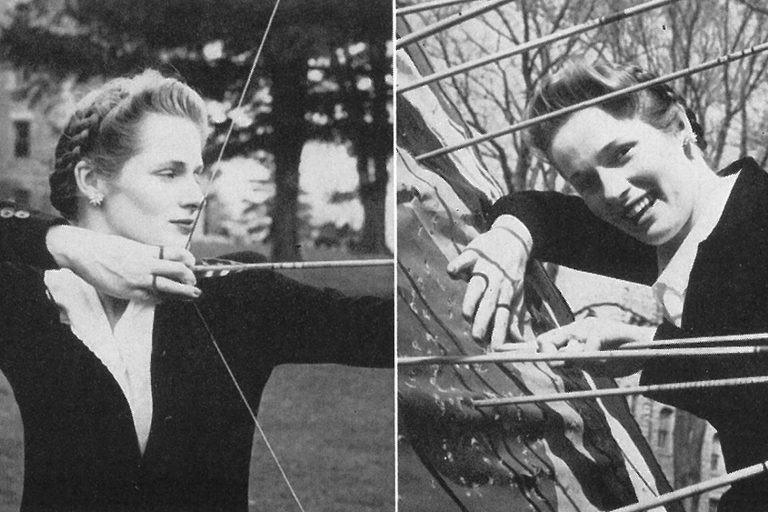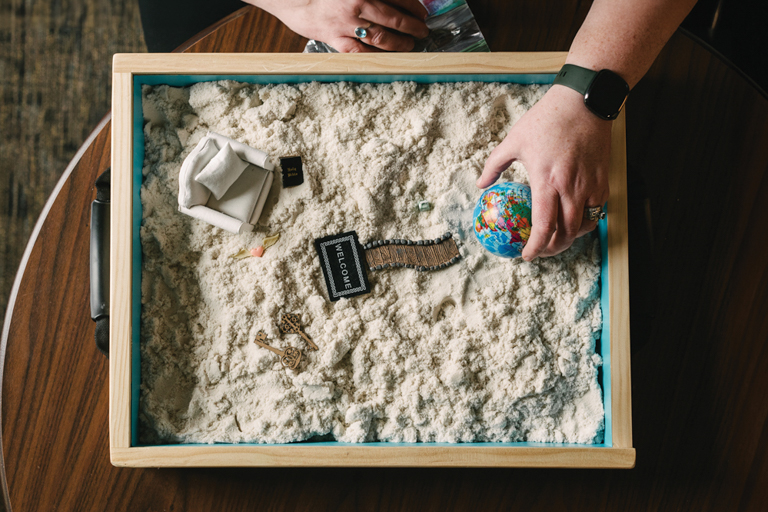Sharing Sacred Space
A legacy of hospitality at Wheaton extends from the present back to the College’s earliest years.
Words: Jen Pollock Michel ’96
Photos: Kayla Smith
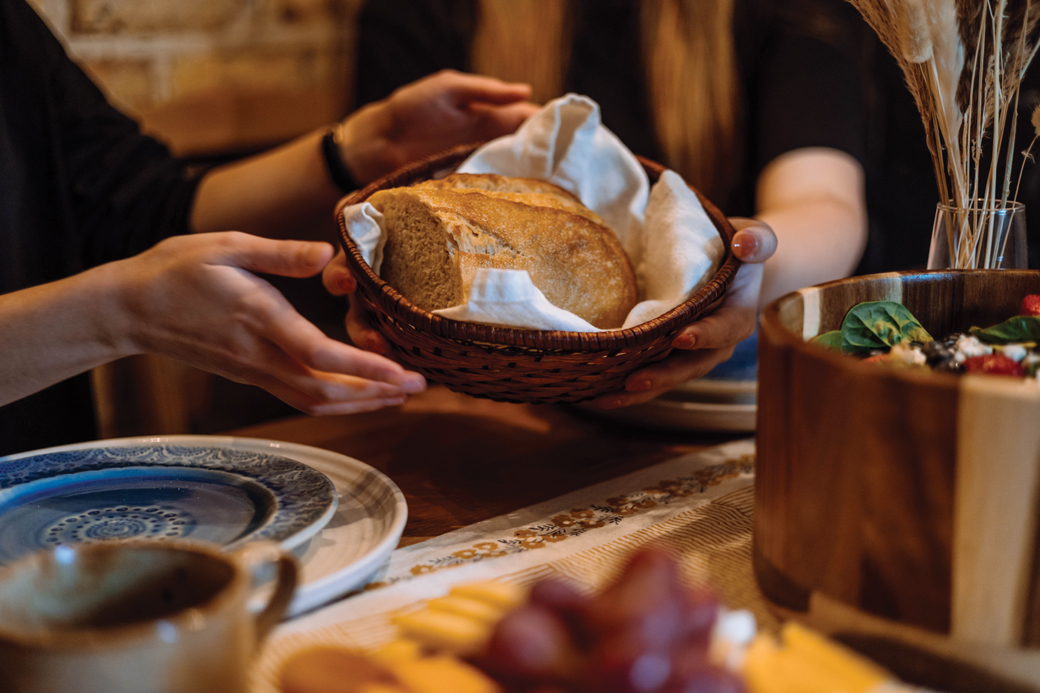
WHEN ALUMNI FROM THE ’50s AND ’60s come through the front door of Westgate, the home of the alumni engagement team, they point toward the dining room: “I remember having dinner with Prexy and his wife right here!” Chief Alumni Officer Cindra Stackhouse Taetzsch ’82 says these former students are relieved that little seems changed from their memories of the two-story home on Washington Street, in which they were hosted by President V. Raymond Edman and his wife, Edith.
Before President Hudson T. Armerding turned over the keys to the Alumni Association in 1980, Westgate served as residence to three College presidents. The house, a College purchase in 1936, was presented as a surprise to Edman’s predecessor, Rev. James Oliver Buswell, on the tenth anniversary of his tenure. As reported in The Wheaton Alumni News, a precursor to Wheaton magazine, the gift of this “splendid President’s residence” was of “fine proportions, of brick with green tile roof and is in every way adequate to serve the College as the home of its President.”
Reading through this scanned file, I was struck by the adjectives splendid and adequate. Did Westgate’s 1936 “adequacy” suggest a propriety of size and décor—a not-too-small, not-too-showy Goldilocks interior for the home of a Christian college president? (By the “mingled emotions” on Buswell’s face when the gift was publicly revealed, it might have been more “splendid” in his estimation.) The words adequate and splendid also pose the question: What spaces best accommodate the kind of hospitality for which Westgate was surely intended?
Dr. Mortimer Lane, a Wheaton political science and economics professor in Edman’s era, and his wife, Mary, were well known for their hospitality to Wheaton students, including the late Rev. Billy Graham ’43. Like many other undergraduates who strolled past the Lane house on the way home from church on Sunday evenings, Graham was often invited inside and shown to the dining room, where a large table was laden with cold meats and refreshments. Archival materials at the College document Graham as recalling, “Quite well-off, they entertained students in their large, comfortable Victorian home near the campus.”
In a consumer society, hospitality is often equated with outsized material expectations. Even Martha Kilby—who, according to Marjorie Lamp Mead ’74, M.A. ’06, Associate Director of the Marion E. Wade Center, was never known for her home cooking but rather the warmth of her welcome—hosted students with a simple elegance learned in her turn-of-the-century, wealthy Southern household. She’d never learned to cook or clean while growing up, as those tasks were assigned to the family’s coterie of domestic servants. So the wife of Dr. Clyde S. Kilby, founder of the Wade Center and former English professor, was famed for a hospitality that was more likely to include Constant Comment® tea and store-bought pecan sandies on fine bone china.
According to Marilee Melvin ’72, former Vice President of Alumni Relations, “For a student in the ’70s, that felt like the soul of elegance.”
MOST UNDERSTANDINGS OF hospitality today have a minimal moral component,” writes Christine Pohl in Making Room: Recovering Hospitality as a Christian Tradition (Eerdmans, 1999). “Hospitality is a nice extra if we have the time or the resources.” But long before the single-family home and expensive dishware, God’s people practiced hospitality as a way to re-enact the gospel drama of God as host, humanity as guest. To be sure, in the Christian tradition, hospitality is food and table because the Lord Jesus gave us a meal by which to remember him. But hospitality is more than a material act; it is also a quality of presence. To be truly hospitable, one prayerfully prepares an interior space to embrace the other and see in one’s guest reflections of both oneself and the image of God.
Space material and immaterial has been prepared for over 40 years running in the home of professors emeriti Dr. Sharon Coolidge ’72 and Dr. Norm Ewert hon. “I came for the speakers, and I stayed for the natural light—and the food, especially the curry,” said one attendee of Mennonite Dinner, hosted on Thursday nights. In an article published in the Journal of Mennonite Studies, Human Needs and Global Resources professors Dr. Laura S. Meitzner Yoder and Dr. James Huff reveal that Coolidge and Ewert didn’t originally intend an average weekly gathering of 50-some people. Had they anticipated the growth of their efforts, their 900-square-foot house, one block from campus, might have seemed less than adequate for the work.
Eventually, the couple designed and constructed a second story and a 21-foot solarium to accommodate their dinner guests and the snaking queue that forms, week after week, in the entryway, covered in shoes. “When I look back on this Mennonite experience,” one student mused, “it is more about the presence and the attentiveness: the attentiveness to the food, to the speaker, and the quiet listening.” Although the food is modest and students arrive early to set up (and stay late to clean up), the meal requires three full days of preparation: Monday for menu planning, Tuesday for food shopping, and Wednesday for preparation and cooking. Such time-intensive hospitality makes for what another attendee calls “a lively, sacred space.”
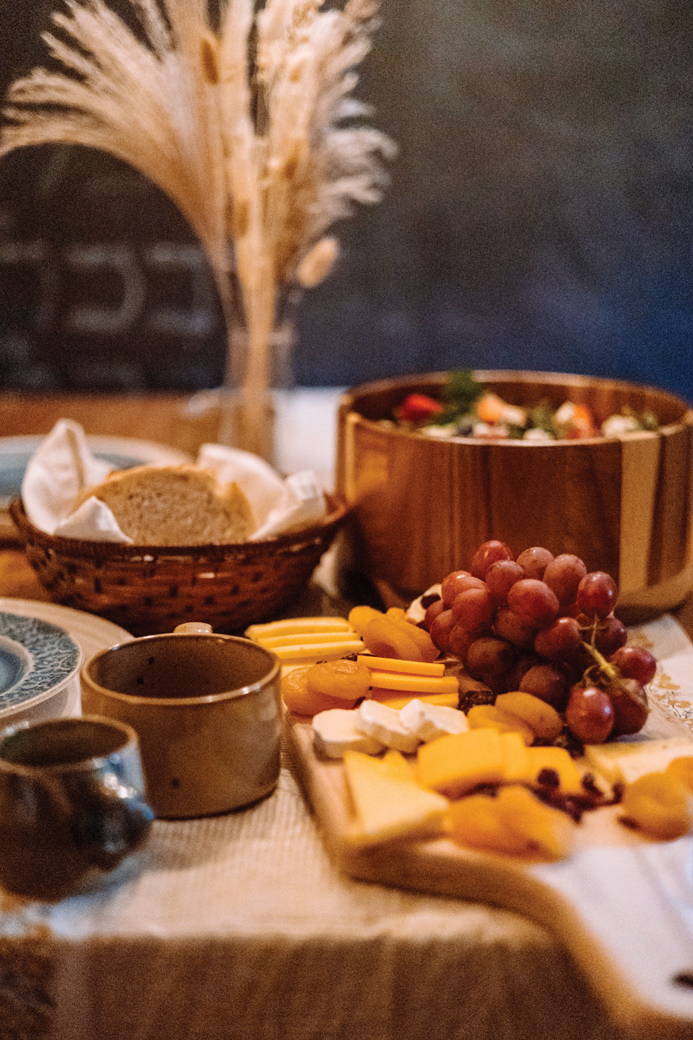
A table set with bread, salad, and charcuterie.
Beginning with the College’s first presidents, Jonathan and Charles Blanchard, who boarded students of color in their homes, Wheaton’s administration, faculty, and staff have actively created space to welcome students. It was 1993 when I first crossed the threshold of Dr. Lyle and Mrs. Mary Dorsett’s home on Howard Street, a stone’s throw from Smith-Traber Hall. I was six months new to the death of my father, and when I sought him out for counsel in his office, Dr. Dorsett, then a professor of Christian formation and ministry, called Mary. “I’m sending Jen over to meet you.”
When the Dorsetts first arrived on campus in 1983, they were freshly grieving the sudden death of their ten-year-old daughter, Erika. To pay for the broken furnace that first lonely winter, Mary began working in Archives & Special Collections, where she met Sandy, a student worker whose mother had just died. When I reconnected recently with Mary over the phone, she recounted how the two women bonded over grief. “I realized how much she needed someone who could help her,” Mary said, underscoring that students unacquainted with loss often evade their grieving classmates for fear of saying the wrong thing. “From that one tragedy of my own daughter’s death, my ministry to grieving students was born.”
In the stories of many members of the Wheaton College community, hospitality grew organically from shared experiences. First-generation students learned from first-generation professors at campus events designed for these kinds of interactions. Third-culture kids (TCKs) learned from staff and other volunteers who had successfully navigated the challenge of crossing borders and cultures. For example, Sarita George Davis ’19 testifies to her experience with regular TCK “family dinners,” launched in 2013 by Josh Okerman ’07 and his wife, Mara. Davis found comfort in a context of worship in multiple languages and safe conversations about American cultural norms. “The assumption for once in our lives was that the answer to the question, ‘Where are you from?’ was going to be a long, complicated history,” said Davis, a missionary kid from Peru. “People understood this.”
“We invite our third-culture students into a family dinner atmosphere,” said Okerman, who serves as the Director of Digital Communications and Alumni Programs in the alumni engagement office. “We sit down, enjoy a family meal, talk, get to know each other, share the space. When adults ask, ‘What can I help with?’ I always tell them, ‘Be here. Talk. I don’t need your help with the food.’” Still, the food is not peripheral to the event, and dinner hosts need flexibility to cook for a group that may range from 15 to 55, depending on the given week.
“No matter the meal, there’s always rice,” Okerman said.
Another home that regularly welcomes students for a meal is that of Dr. Chris Keil, Professor of Environmental Science, and his wife, Maureen. “Keil Dinner” takes place on Sunday nights for a group that might swell, on occasion, to 24. “We let God decide who needs to come each week,” said Maureen. On Sunday nights, the Keils set a simple table of fresh bread and homemade soup. “If the numbers change, I pour more water in the soup pot,” Maureen said. On occasion, Chris and Maureen are left without chairs. That the space is sometimes tight, that the fare is always modest, is never an obstacle to hospitality, however. “No one fusses about the food or worries about scarcity,” Maureen said. “The students don’t care about that. They’re just so hungry to be in a home and have a tighter sense of community.”
Maureen is one of several volunteer faculty wives leading other hospitality efforts across campus, extending a welcome to students beyond dinner invitations. Most notably, together with Kim Walton (married to Professor of Old Testament Emeritus Dr. John Walton M.A. ’75) and Cindy Bretsen (married to Professor of Business and Law Dr. Stephen Bretsen), Maureen helps supervise operations for the Corinthian Co-op. The initiative serves the Wheaton College community by providing a place to give and receive used clothing and household items. A host of volunteers collects and sorts donations, washes and repairs clothing, organizes seasonal sales, and even ensures that electronics are in good working order. MKs, TCKs, and international students coming from warmer climates often express relief for having first dibs on the inventory of winter coats in preparation for frigid temperatures.
“We want people to feel loved and taken care of,” said Maureen, who doesn’t equate the practice of hospitality to “special food and having your table look just so.”
TO BE WELCOMED IN—out of the dark and bitter cold of the world—is to experience the grace of God in a very tangible way. But welcome doesn’t happen accidentally, says Steve Ivester ’93, M.A. ’03, Dean for Student Engagement. He uses words like depth, thoughtfulness, and vision to characterize the ways he tries to engage in gospel-minded hospitality at home and on campus. Ivester’s Wheaton home, which he designed himself, embodies his intention to welcome people into a space where formation—and transformation—into the image of Christ can happen.
“I listen loudly,” Ivester said, describing his interactions with the many who enter through the revolving door of “Grand Pointe,” the name he’s given his house. “Listening well helps me love well and celebrate the other who is different from me.” Learning from Dietrich Bonhoeffer, Henri Nouwen, and Christine Pohl, Ivester understands the work of hospitality less as a discrete list of tasks and more as space we cultivate by prayer and presence, vision and blessing. “At the heart of hospitality, we’re embodying the word welcome,” he added. “We’re saying that the coming of this person is well and good, and this is informed by God’s hospitality to us as strangers. He opened up the world of creation and beauty for us.”
This good news of God’s hospitality to humanity is helping to heal the heart of Jonathan Old Horse, a Lakotan pastor and current Billy Graham Scholar. Separated at birth from his indigenous mother and adopted by a white family, he was invariably severed from his sense of family heritage. In a majority context growing up, Old Horse suffered contempt for being Lakotan. “They laugh at us,” he said. “They make fun of us. They say that we are mistakes.” Despite these many traumas, through the love of his father-in-law, he experienced the love of God and learned the truth of Tunkasila Jesus.
Years ago, a relationship between Old Horse’s South Dakota congregation, Woyatan Lutheran Church, and Wheaton College first developed when Associate Professor of Music Dr. Johann Buis invited Old Horse to speak to students at the Wheaton College Field Station in the Black Hills about Lakotan spiritual hymns. This “sharing of knowledge,” as Old Horse describes it, became a way to reciprocate hospitality. Although mistrust still often exists between indigenous people and Christians, repair is happening between the Woyatan congregation and the Wheaton College community. Every summer, students at the Black Hills Station worship at Woyatan Lutheran Church and sing, with their Lakotan “relatives” in Christ, the opening hymn, “All Are Welcome.”
All are welcome, friend and stranger,
At the banquet of the Savior.
All are welcome, all are welcome here.
“Wheaton students are amazed that Lakotans, who were and in some ways still are oppressed by a weaponized Christianity, welcome them as ‘relatives,’” said Chris Keil, who holds a deep friendship with Old Horse.
On campus for his first orientation as a graduate student, Old Horse was grateful for the welcome he received from members of the Wheaton College community. “There are so many gifts Wheaton has given to me,” he said. “They love me. They see me as a human. They have given me the best of everything, including a Billy Graham Scholarship. This helps me with my traumas, and they have helped to heal my heart.”
Old Horse dreams of a future generation of Lakotan children coming to study at Wheaton. “I want our congregation to know Wheaton is kind,” he said.
“THE PRACTICE OF HOSPITALITY,” writes Pohl, “forces abstract commitments to loving the neighbor, stranger, and enemy into practice. . . . The twin moves of universalizing the neighbor and personalizing the stranger are at the core of hospitality.”
To see hospitality in this way is to see its promise for healing the national wounds that have formed around obvious fissures of difference: political, racial, confessional, demographic. In a world where individuals are increasingly wary of the other, Christian hospitality practices a curiosity and vulnerability that creates space for unlikely relationships in the name of Jesus, whose love reconciles and redeems. This demands resources beyond square footage. It requires patience, vulnerability, and time.
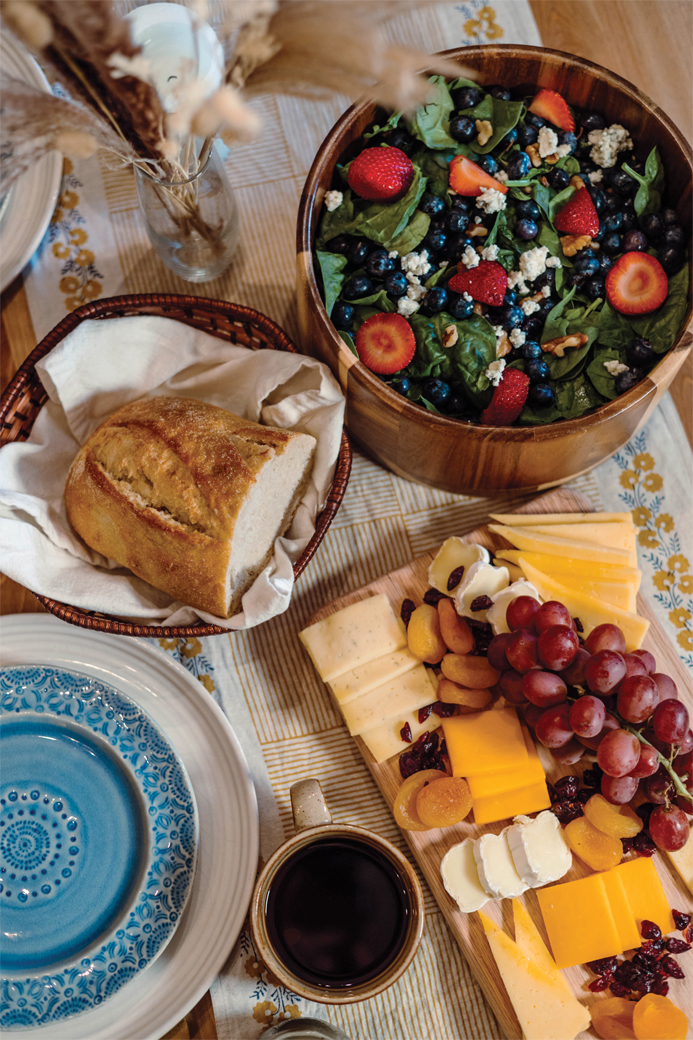
Ready to share a meal with guests.
Donovan Michel ’25, a Bible and theology major, “entered the world” of Associate Professor of Geology Dr. Andrew Luhmann ’06 when he was invited mid-semester, along with his classmates, to share a meal with the professor and his family. “Wow, I’m seeing this man’s entire life right here,” thought Michel at the time, acknowledging the intimacy and vulnerability of the occasion. “You can trust someone a lot when you get to see their house, their kids,” he added. “That level of openness is crazy. It transcends the age gap and the power difference. You even say to yourself, ‘Maybe I could live like that.’”
Mead defines hospitality as “a way of welcoming people in the name of Christ.” She added, “You can give people hospitality in different ways, depending on your circumstances.” In Melvin’s case, she gladly gives Wheaton students the time she’s enjoyed without responsibilities to a husband or children. Since teaching a section of “Freshman Experience” starting in the mid-1990s, Melvin began meeting with a small group of women and inviting them into her home, “Pilgrim’s Rest,” for tea and discipleship on Sunday afternoons. Over her fireplace mantel hangs a sign inscribed with a Latin phrase: Ubi caritas et amor, Deus ibi est. “Where charity and love are, there God is.”
“The students have loved circling up around that sign with conversation and resting in the Lord’s presence,” Melvin said.
Guest is the identity of every human being graciously welcomed into the world God made and seated at the table laid with the body and blood of Jesus. In the words of the psalmist David, “Hear my prayer, O Lord, and give ear to my cry; hold not your peace at my tears! For I am a sojourner with you, a guest, like all my fathers” (Ps. 39:12, ESV). As evidenced in the gospel, hospitality is a gift we humbly receive long before it is a gift we freely offer.
“Hospitality is a spiritual capacity of the heart,” Ivester said. “The self is there for the other person just as Christ is here for us. My welcome comes from that.”
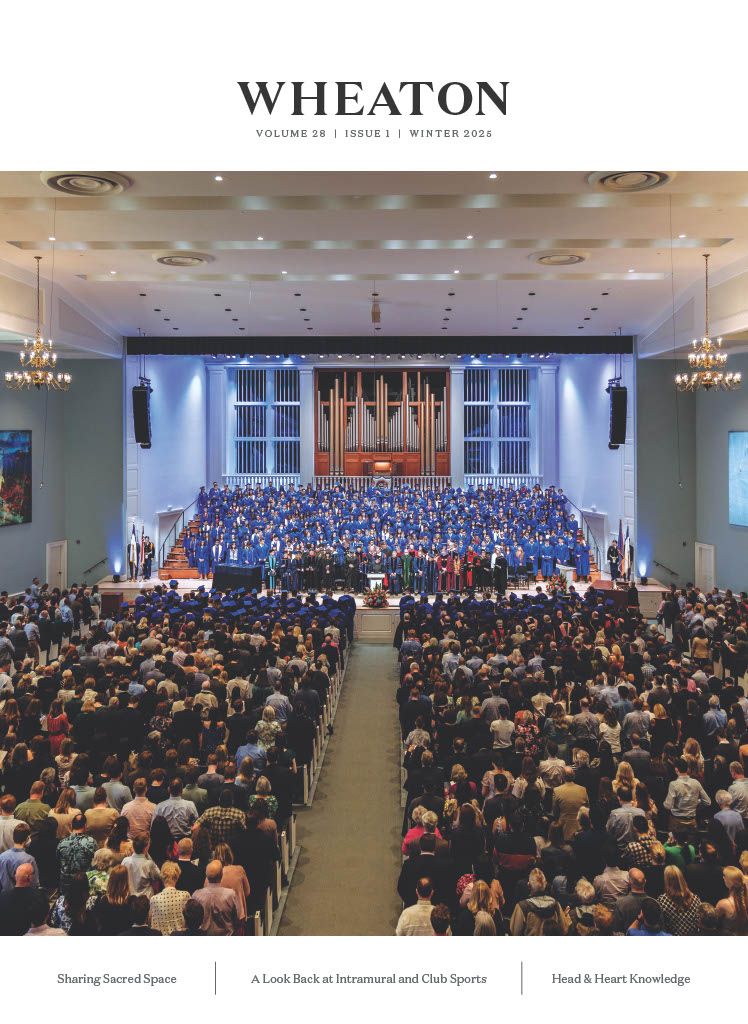
.jpg)
